从社会会语言学的角度分析电影《窈窕淑女》的对白
- 格式:pdf
- 大小:276.37 KB
- 文档页数:25
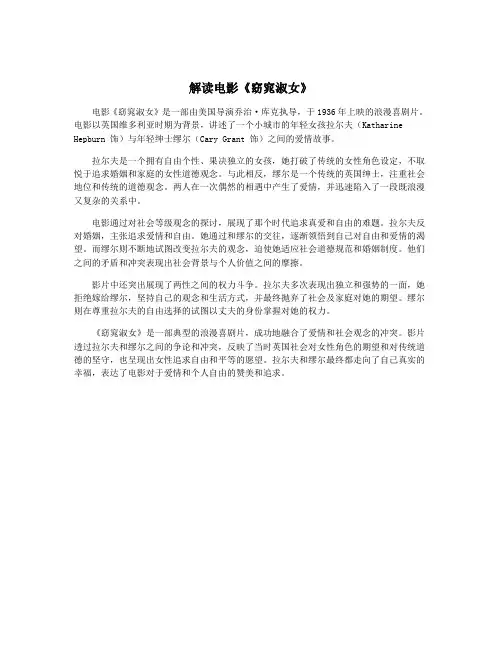
解读电影《窈窕淑女》
电影《窈窕淑女》是一部由美国导演乔治·库克执导,于1936年上映的浪漫喜剧片。
电影以英国维多利亚时期为背景,讲述了一个小城市的年轻女孩拉尔夫(Katharine Hepburn 饰)与年轻绅士缪尔(Cary Grant 饰)之间的爱情故事。
拉尔夫是一个拥有自由个性、果决独立的女孩,她打破了传统的女性角色设定,不取悦于追求婚姻和家庭的女性道德观念。
与此相反,缪尔是一个传统的英国绅士,注重社会地位和传统的道德观念。
两人在一次偶然的相遇中产生了爱情,并迅速陷入了一段既浪漫又复杂的关系中。
电影通过对社会等级观念的探讨,展现了那个时代追求真爱和自由的难题。
拉尔夫反对婚姻,主张追求爱情和自由。
她通过和缪尔的交往,逐渐领悟到自己对自由和爱情的渴望。
而缪尔则不断地试图改变拉尔夫的观念,迫使她适应社会道德规范和婚姻制度。
他们之间的矛盾和冲突表现出社会背景与个人价值之间的摩擦。
影片中还突出展现了两性之间的权力斗争。
拉尔夫多次表现出独立和强势的一面,她拒绝嫁给缪尔,坚持自己的观念和生活方式,并最终抛弃了社会及家庭对她的期望。
缪尔则在尊重拉尔夫的自由选择的试图以丈夫的身份掌握对她的权力。
《窈窕淑女》是一部典型的浪漫喜剧片,成功地融合了爱情和社会观念的冲突。
影片透过拉尔夫和缪尔之间的争论和冲突,反映了当时英国社会对女性角色的期望和对传统道德的坚守,也呈现出女性追求自由和平等的愿望。
拉尔夫和缪尔最终都走向了自己真实的幸福,表达了电影对于爱情和个人自由的赞美和追求。
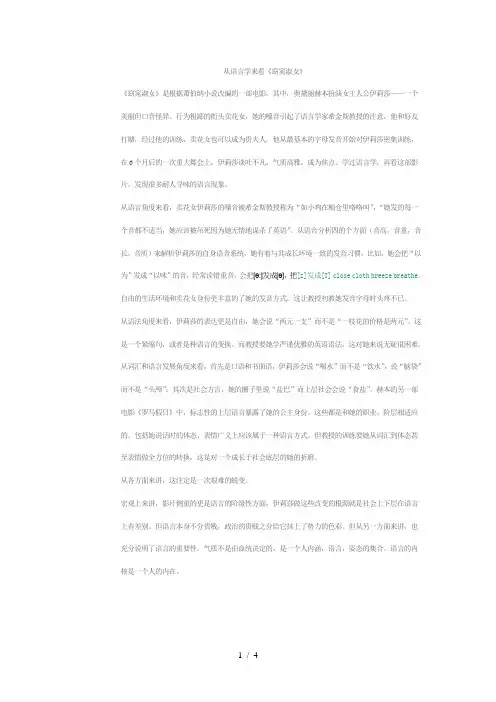
从语言学来看《窈窕淑女》《窈窕淑女》是根据萧伯纳小说改编的一部电影,其中,奥黛丽赫本扮演女主人公伊莉莎——一个美丽但口音怪异、行为粗鄙的街头卖花女,她的嗓音引起了语言学家希金斯教授的注意,他和好友打赌,经过他的训练,卖花女也可以成为贵夫人。
他从最基本的字母发音开始对伊莉莎密集训练,在6个月后的一次重大舞会上,伊莉莎谈吐不凡,气质高雅,成为焦点。
学过语言学,再看这部影片,发现很多耐人寻味的语言现象。
从语言角度来看,卖花女伊莉莎的嗓音被希金斯教授称为“如小鸡在粮仓里咯咯叫”,“她发的每一个音都不适当,她应该被吊死因为她无情地谋杀了英语”。
从语音分析四的个方面(音高,音重,音长,音质)来解析伊莉莎的自身语音系统,她有着与其成长环境一致的发音习惯,比如,她会把“以为”发成“以味”的音,经常读错重音,会把[ə:]发成[ə],把[z]发成[T] close cloth breeze breathe。
自由的生活环境和卖花女身份更丰富的了她的发音方式。
这让教授初教她发音字母时头疼不已。
从语法角度来看,伊莉莎的表达更是自由,她会说“两元一支”而不是“一枝花的价格是两元”。
这是一个紧缩句,或者是种语言的变换。
而教授要她学严谨优雅的英语语法,这对她来说无疑很困难。
从词汇和语言发展角度来看,首先是口语和书面语,伊莉莎会说“喝水”而不是“饮水”,说“脑袋”而不是“头颅”;其次是社会方言,她的圈子里说“盐巴”而上层社会会说“食盐”。
赫本的另一部电影《罗马假日》中,标志性的上层语言暴露了她的公主身份。
这些都是和她的职业、阶层相适应的。
包括她说话时的体态、表情广义上应该属于一种语言方式。
但教授的训练要她从词汇到体态甚至表情做全方位的转换,这是对一个成长于社会底层的她的折磨。
从各方面来讲,这注定是一次艰难的蜕变。
宏观上来讲,影片侧重的更是语言的阶级性方面,伊莉莎做这些改变的根源就是社会上下层在语言上有差别。
但语言本身不分贵贱,政治的贵贱之分给它抹上了势力的色彩。
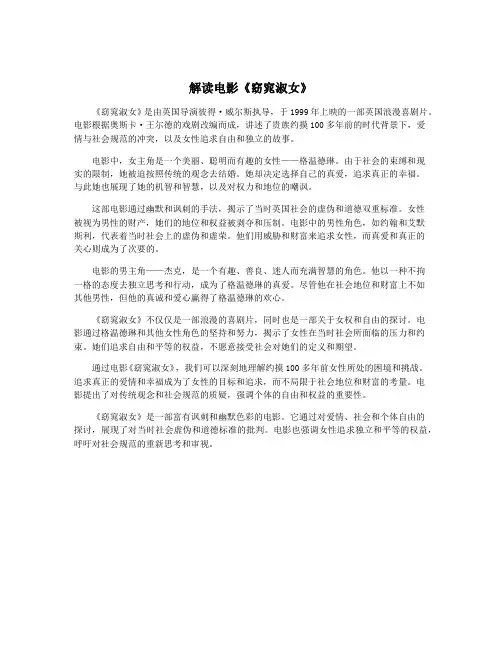
解读电影《窈窕淑女》《窈窕淑女》是由英国导演彼得·威尔斯执导,于1999年上映的一部英国浪漫喜剧片。
电影根据奥斯卡·王尔德的戏剧改编而成,讲述了贵族约摸100多年前的时代背景下,爱情与社会规范的冲突,以及女性追求自由和独立的故事。
电影中,女主角是一个美丽、聪明而有趣的女性——格温德琳。
由于社会的束缚和现实的限制,她被迫按照传统的观念去结婚。
她却决定选择自己的真爱,追求真正的幸福。
与此她也展现了她的机智和智慧,以及对权力和地位的嘲讽。
这部电影通过幽默和讽刺的手法,揭示了当时英国社会的虚伪和道德双重标准。
女性被视为男性的财产,她们的地位和权益被剥夺和压制。
电影中的男性角色,如约翰和艾默斯利,代表着当时社会上的虚伪和虚荣。
他们用威胁和财富来追求女性,而真爱和真正的关心则成为了次要的。
电影的男主角——杰克,是一个有趣、善良、迷人而充满智慧的角色。
他以一种不拘一格的态度去独立思考和行动,成为了格温德琳的真爱。
尽管他在社会地位和财富上不如其他男性,但他的真诚和爱心赢得了格温德琳的欢心。
《窈窕淑女》不仅仅是一部浪漫的喜剧片,同时也是一部关于女权和自由的探讨。
电影通过格温德琳和其他女性角色的坚持和努力,揭示了女性在当时社会所面临的压力和约束。
她们追求自由和平等的权益,不愿意接受社会对她们的定义和期望。
通过电影《窈窕淑女》,我们可以深刻地理解约摸100多年前女性所处的困境和挑战。
追求真正的爱情和幸福成为了女性的目标和追求,而不局限于社会地位和财富的考量。
电影提出了对传统观念和社会规范的质疑,强调个体的自由和权益的重要性。
《窈窕淑女》是一部富有讽刺和幽默色彩的电影。
它通过对爱情、社会和个体自由的探讨,展现了对当时社会虚伪和道德标准的批判。
电影也强调女性追求独立和平等的权益,呼吁对社会规范的重新思考和审视。
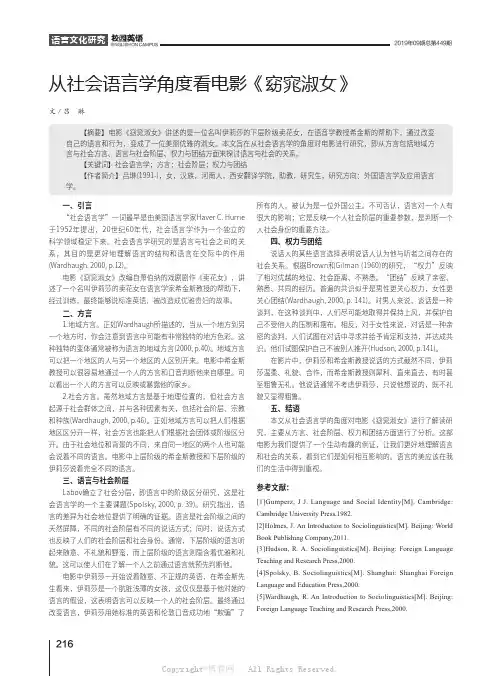
2162019年09期总第449期ENGLISH ON CAMPUS从社会语言学角度看电影《窈窕淑女》文/吕 琳【摘要】电影《窈窕淑女》讲述的是一位名叫伊莉莎的下层阶级卖花女,在语音学教授希金斯的帮助下,通过改变自己的语言和行为,变成了一位美丽优雅的淑女。
本文旨在从社会语言学的角度对电影进行研究,即从方言包括地域方言与社会方言、语言与社会阶层、权力与团结方面来探讨语言与社会的关系。
【关键词】社会语言学;方言;社会阶层;权力与团结 【作者简介】吕琳(1991-),女,汉族,河南人,西安翻译学院,助教,研究生,研究方向:外国语言学及应用语言学。
所有的人,被认为是一位外国公主。
不可否认,语言对一个人有很大的影响;它是反映一个人社会阶层的重要参数,是判断一个人社会身份的重要方法。
四、权力与团结说话人的某些语言选择表明说话人认为他与听者之间存在的社会关系。
根据Brown和Gilman (1960)的研究,“权力”反映了相对优越的地位、社会距离、不熟悉。
“团结”反映了亲密、熟悉、共同的经历。
普遍的共识似乎是男性更关心权力,女性更关心团结(Wardhaugh, 2000, p. 141)。
对男人来说,谈话是一种谈判,在这种谈判中,人们尽可能地取得并保持上风,并保护自己不受他人的压制和摆布。
相反,对于女性来说,对话是一种亲密的谈判,人们试图在对话中寻求并给予肯定和支持,并达成共识。
他们试图保护自己不被别人推开(Hudson, 2000, p.141)。
在影片中,伊莉莎和希金斯教授说话的方式截然不同,伊莉莎温柔、礼貌、合作,而希金斯教授则犀利、直来直去,有时甚至粗鲁无礼。
他说话通常不考虑伊莉莎,只说他想说的,既不礼貌又显得粗鲁。
五、结语本文从社会语言学的角度对电影《窈窕淑女》进行了解读研究,主要从方言、社会阶层、权力和团结方面进行了分析。
这部电影为我们提供了一个生动有趣的例证,让我们更好地理解语言和社会的关系,看到它们是如何相互影响的。
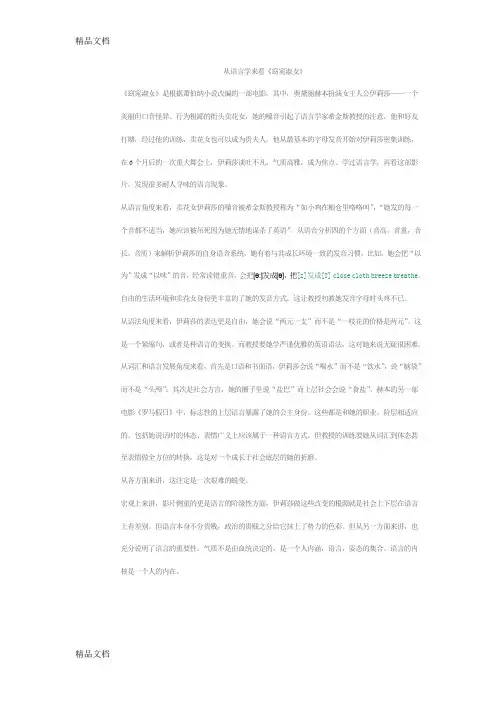
从语言学来看《窈窕淑女》《窈窕淑女》是根据萧伯纳小说改编的一部电影,其中,奥黛丽赫本扮演女主人公伊莉莎——一个美丽但口音怪异、行为粗鄙的街头卖花女,她的嗓音引起了语言学家希金斯教授的注意,他和好友打赌,经过他的训练,卖花女也可以成为贵夫人。
他从最基本的字母发音开始对伊莉莎密集训练,在6个月后的一次重大舞会上,伊莉莎谈吐不凡,气质高雅,成为焦点。
学过语言学,再看这部影片,发现很多耐人寻味的语言现象。
从语言角度来看,卖花女伊莉莎的嗓音被希金斯教授称为“如小鸡在粮仓里咯咯叫”,“她发的每一个音都不适当,她应该被吊死因为她无情地谋杀了英语”。
从语音分析四的个方面(音高,音重,音长,音质)来解析伊莉莎的自身语音系统,她有着与其成长环境一致的发音习惯,比如,她会把“以为”发成“以味”的音,经常读错重音,会把[ə:]发成[ə],把[z]发成[T] close cloth breeze breathe。
自由的生活环境和卖花女身份更丰富的了她的发音方式。
这让教授初教她发音字母时头疼不已。
从语法角度来看,伊莉莎的表达更是自由,她会说“两元一支”而不是“一枝花的价格是两元”。
这是一个紧缩句,或者是种语言的变换。
而教授要她学严谨优雅的英语语法,这对她来说无疑很困难。
从词汇和语言发展角度来看,首先是口语和书面语,伊莉莎会说“喝水”而不是“饮水”,说“脑袋”而不是“头颅”;其次是社会方言,她的圈子里说“盐巴”而上层社会会说“食盐”。
赫本的另一部电影《罗马假日》中,标志性的上层语言暴露了她的公主身份。
这些都是和她的职业、阶层相适应的。
包括她说话时的体态、表情广义上应该属于一种语言方式。
但教授的训练要她从词汇到体态甚至表情做全方位的转换,这是对一个成长于社会底层的她的折磨。
从各方面来讲,这注定是一次艰难的蜕变。
宏观上来讲,影片侧重的更是语言的阶级性方面,伊莉莎做这些改变的根源就是社会上下层在语言上有差别。
但语言本身不分贵贱,政治的贵贱之分给它抹上了势力的色彩。
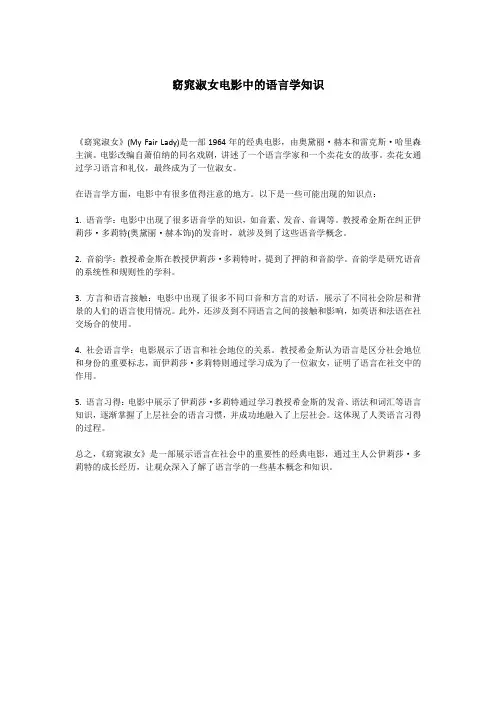
窈窕淑女电影中的语言学知识
《窈窕淑女》(My Fair Lady)是一部1964年的经典电影,由奥黛丽·赫本和雷克斯·哈里森主演。
电影改编自萧伯纳的同名戏剧,讲述了一个语言学家和一个卖花女的故事。
卖花女通过学习语言和礼仪,最终成为了一位淑女。
在语言学方面,电影中有很多值得注意的地方。
以下是一些可能出现的知识点:
1. 语音学:电影中出现了很多语音学的知识,如音素、发音、音调等。
教授希金斯在纠正伊莉莎·多莉特(奥黛丽·赫本饰)的发音时,就涉及到了这些语音学概念。
2. 音韵学:教授希金斯在教授伊莉莎·多莉特时,提到了押韵和音韵学。
音韵学是研究语音的系统性和规则性的学科。
3. 方言和语言接触:电影中出现了很多不同口音和方言的对话,展示了不同社会阶层和背景的人们的语言使用情况。
此外,还涉及到不同语言之间的接触和影响,如英语和法语在社交场合的使用。
4. 社会语言学:电影展示了语言和社会地位的关系。
教授希金斯认为语言是区分社会地位和身份的重要标志,而伊莉莎·多莉特则通过学习成为了一位淑女,证明了语言在社交中的作用。
5. 语言习得:电影中展示了伊莉莎·多莉特通过学习教授希金斯的发音、语法和词汇等语言知识,逐渐掌握了上层社会的语言习惯,并成功地融入了上层社会。
这体现了人类语言习得的过程。
总之,《窈窕淑女》是一部展示语言在社会中的重要性的经典电影,通过主人公伊莉莎·多莉特的成长经历,让观众深入了解了语言学的一些基本概念和知识。
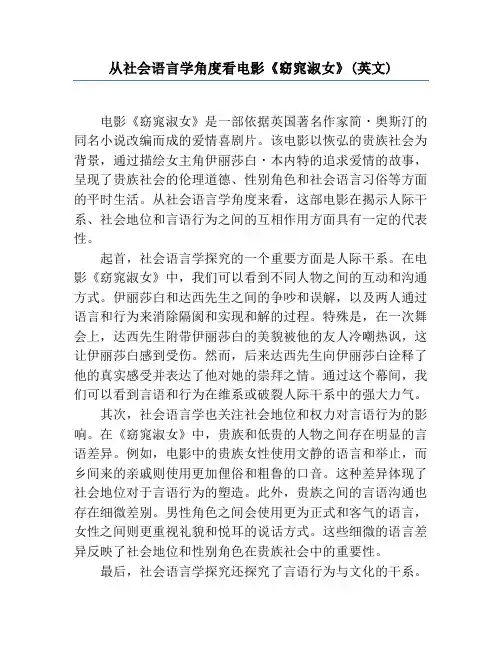
从社会语言学角度看电影《窈窕淑女》(英文)电影《窈窕淑女》是一部依据英国著名作家简・奥斯汀的同名小说改编而成的爱情喜剧片。
该电影以恢弘的贵族社会为背景,通过描绘女主角伊丽莎白・本内特的追求爱情的故事,呈现了贵族社会的伦理道德、性别角色和社会语言习俗等方面的平时生活。
从社会语言学角度来看,这部电影在揭示人际干系、社会地位和言语行为之间的互相作用方面具有一定的代表性。
起首,社会语言学探究的一个重要方面是人际干系。
在电影《窈窕淑女》中,我们可以看到不同人物之间的互动和沟通方式。
伊丽莎白和达西先生之间的争吵和误解,以及两人通过语言和行为来消除隔阂和实现和解的过程。
特殊是,在一次舞会上,达西先生附带伊丽莎白的美貌被他的友人冷嘲热讽,这让伊丽莎白感到受伤。
然而,后来达西先生向伊丽莎白诠释了他的真实感受并表达了他对她的崇拜之情。
通过这个幕间,我们可以看到言语和行为在维系或破裂人际干系中的强大力气。
其次,社会语言学也关注社会地位和权力对言语行为的影响。
在《窈窕淑女》中,贵族和低贵的人物之间存在明显的言语差异。
例如,电影中的贵族女性使用文静的语言和举止,而乡间来的亲戚则使用更加俚俗和粗鲁的口音。
这种差异体现了社会地位对于言语行为的塑造。
此外,贵族之间的言语沟通也存在细微差别。
男性角色之间会使用更为正式和客气的语言,女性之间则更重视礼貌和悦耳的说话方式。
这些细微的语言差异反映了社会地位和性别角色在贵族社会中的重要性。
最后,社会语言学探究还探究了言语行为与文化的干系。
电影中的贵族社会有其奇特的社会习俗和礼仪规范。
例如,在舞会上,男性务必请求女性的手伸出邀请舞蹈,而女性则要谢绝几次后才能答应。
这些社会语言行为符合当时英国贵族社会的特定文化规范,并且反映了贵族社会对于约定俗成的细节的重视。
此外,电影中亲属之间的交谈也反映了贵族社会对于亲情干系的重视,亲人之间沟通更多是以尊重和关怀为基调。
总结起来,电影《窈窕淑女》从社会语言学角度呈现了人际干系、社会地位和文化对于言语行为的重要作用。
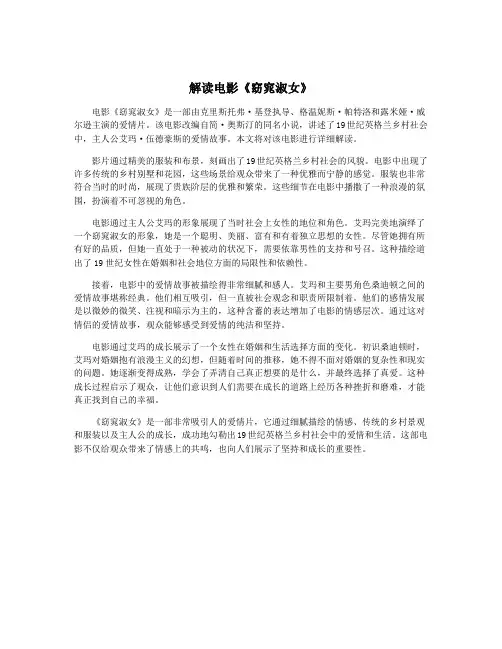
解读电影《窈窕淑女》电影《窈窕淑女》是一部由克里斯托弗·基登执导、格温妮斯·帕特洛和露米娅·威尔逊主演的爱情片。
该电影改编自简·奥斯汀的同名小说,讲述了19世纪英格兰乡村社会中,主人公艾玛·伍德豪斯的爱情故事。
本文将对该电影进行详细解读。
影片通过精美的服装和布景,刻画出了19世纪英格兰乡村社会的风貌。
电影中出现了许多传统的乡村别墅和花园,这些场景给观众带来了一种优雅而宁静的感觉。
服装也非常符合当时的时尚,展现了贵族阶层的优雅和繁荣。
这些细节在电影中播撒了一种浪漫的氛围,扮演着不可忽视的角色。
电影通过主人公艾玛的形象展现了当时社会上女性的地位和角色。
艾玛完美地演绎了一个窈窕淑女的形象,她是一个聪明、美丽、富有和有着独立思想的女性。
尽管她拥有所有好的品质,但她一直处于一种被动的状况下,需要依靠男性的支持和号召。
这种描绘道出了19世纪女性在婚姻和社会地位方面的局限性和依赖性。
接着,电影中的爱情故事被描绘得非常细腻和感人。
艾玛和主要男角色桑迪顿之间的爱情故事堪称经典。
他们相互吸引,但一直被社会观念和职责所限制着。
他们的感情发展是以微妙的微笑、注视和暗示为主的,这种含蓄的表达增加了电影的情感层次。
通过这对情侣的爱情故事,观众能够感受到爱情的纯洁和坚持。
电影通过艾玛的成长展示了一个女性在婚姻和生活选择方面的变化。
初识桑迪顿时,艾玛对婚姻抱有浪漫主义的幻想,但随着时间的推移,她不得不面对婚姻的复杂性和现实的问题。
她逐渐变得成熟,学会了弄清自己真正想要的是什么,并最终选择了真爱。
这种成长过程启示了观众,让他们意识到人们需要在成长的道路上经历各种挫折和磨难,才能真正找到自己的幸福。
《窈窕淑女》是一部非常吸引人的爱情片,它通过细腻描绘的情感、传统的乡村景观和服装以及主人公的成长,成功地勾勒出19世纪英格兰乡村社会中的爱情和生活。
这部电影不仅给观众带来了情感上的共鸣,也向人们展示了坚持和成长的重要性。
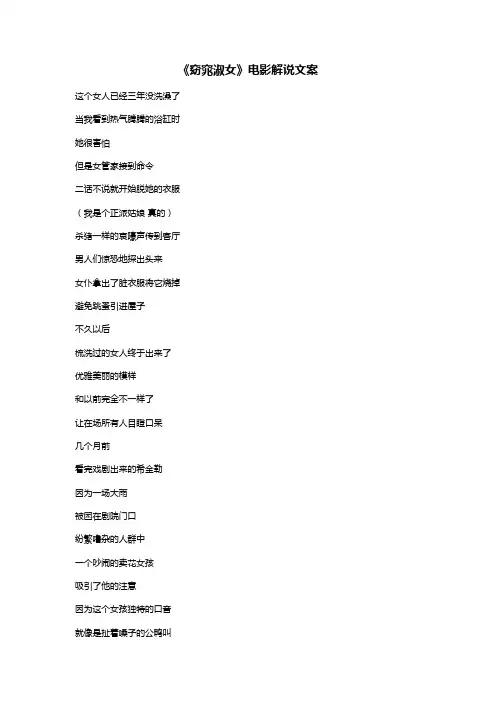
《窈窕淑女》电影解说文案这个女人已经三年没洗澡了当我看到热气腾腾的浴缸时她很害怕但是女管家接到命令二话不说就开始脱她的衣服(我是个正派姑娘真的)杀猪一样的哀嚎声传到客厅男人们惊恐地探出头来女仆拿出了脏衣服将它烧掉避免跳蚤引进屋子不久以后梳洗过的女人终于出来了优雅美丽的模样和以前完全不一样了让在场所有人目瞪口呆几个月前看完戏剧出来的希金勒因为一场大雨被困在剧院门口纷繁噜杂的人群中一个吵闹的卖花女孩吸引了他的注意因为这个女孩独特的口音就像是扯着嗓子的公鸭叫这让身为语音学家的希金勒难以忍受(按照语法该判她死罪)(为对英语的冷血谋杀)希金勒是语音学的教授可以从一个人说话的口音中判断出这个人的身份和生活的地区而直误差往往不会超过六公里在他看来真正使贵族和平民区分开来的并不是他们的穿看打扮而是他们难以更改的口音优越感爆棚的希金勒甚至夸下海口表示自己可以将一个粗俗的卖花女改造成一个上流社会的淑女说者无意听者有心一旁的卖花女伊莉娜将希金勒的话牢牢记在心里第二天她认真地洗了脸用手上最值钱的衣服把自己裹得像个鸡毛掸子来到了希金勒的家她想通过改变自己的口音让她能争取到一份在花店的工作可希金勒听到她的公鸭叫浑身不舒服抬手就要将她赶出去伊莉娜使出了自己的杀手锏她说自己会支付学费5块钱希金勒都要气笑了这时同为语言学家的朋友皮克林突然来了兴趣他要和希金勒打个赌看他昨天的豪言壮语到底能不能实现6个月内如果希金勒能将伊莉娜打造成一个淑女那他就支付全部学费并且承认希金勒的实力希金勒欣然应战他上下打量一番伊莉娜做的第一件事就是让仆人带她先去洗个澡洗不干净就用砂纸搓他向伊莉娜保证经他改造完成后满大街的男人都会排着队为她赴汤蹈火肝脑涂地可伊莉娜却被他傲慢的态度激慈转身要走希金勒端起一盘巧克力(来块巧克力伊莉娜)巧克力这种东西对贫穷的伊莉娜诱惑可太大了就这样伊莉娜答应下来趁伊莉娜洗澡的时候作为打赌见证人的皮克林提醒希金勒千万不要干柴烈火一时冲动越过了界然而皮克林不知道的是希金勒是个单身利己主义者在他眼里女人就像洪水猛兽一样只会花他的钱吵得他不得安宁所以他让皮克林大可放心于是将粗鲁的卖花小姐改造成上流社会淑女的计划正式开始了往嘴里放六颗珠子然后念绕口令(红鲤鱼与绿鲤鱼)(与鱼我不行)不停地读ABCD直到纸上画出稳定的曲线图用食物做诱饵说出正确的连读音(cupcupof)希金勒的魔鬼训练开始了每天伊莉娜都要进行长达12个小时的学习任务没有完成希金勒就会当看伊莉娜的面把本该属于她的蛋挞拿去喂鸟伊莉娜气得抓耳挠腮在客厅大骂希金勒的坏话想像着他被自己处决的样子谁知一回头希金勒正站在楼梯上看她(A)(ai)终于在一个深夜里伊莉娜受不了了她冲着希金勒大吼大叫谁知这一激动正好发出了正确的读音从那以后伊莉娜就像被打通了任督二脉将口音完全矫正过来长达三个月的训练总算有了成效三人激动得手舞足蹈第二天为了初步检验自己的训练成果希金勒决定带伊莉娜参加即将到来的赛马会赛马会当天伊莉娜一袭精致的修身白裙就像某家高贵的小姐完全让人想不到三个月前她还是个粗鄙的卖花女漂亮的伊莉娜瞬间就征服了年轻帅气的小伙子弗雷迪不过她虽然矫正了口音但能和贵族谈论的话题目前还只是简单的问候语随着谈话的深入伊莉娜就开始逐渐暴露自己希金勒急得顶着茶杯就转身自闭到了赛马的时候伊莉娜一激动更是完全不顾形象(加油多佛摆起你的大屁股)贵族们没见过这么狂野的淑女甚至被吓晕了过去教授拉下帽子羞愧难当回到家后三人垂头丧气显然这是一场极为失败的考验而门外那个叫弗雷迪的小伙子却被热情率真的伊莉娜深深吸引一直追到了家里可此刻的伊莉娜一心只想着刚刚失败的测验希金勒终于明白要想让伊莉娜变成一位真正的淑女仅靠改变口音是远远不够的更重要的是伊莉娜的内涵和气质为了达成最后的目标他再次对伊莉娜进行了三个月的强化训练三个月后终于到了最后的舞会如果舞会上所有人都认为伊莉娜是位淑女那希金勒就成功了但当伊莉娜身穿白色晚礼服款款走下楼梯的时候希金勒觉得他们至少已经成功了一半高贵优雅的女孩缓步走入舞会她举止得体礼仪周全让在场所有人都觉得她一定是某个国家的公主然而谁也不会想到短短三个月前她还是一个言谈粗鄙的卖花女到目前为止伊莉娜的表现都自然得体希金勒信心满满但皮克林却有点担心因为舞会现场来了一位语音学专家会说32国的语言稍不留神就有可能被他识破更不幸的是气质出众的伊莉娜已经吸引了专家的注意这时女王和王子来到了现场伊莉娜的表现获得了女王的盛赞希金勒和皮克林挤眉弄眼骄傲之情溢于言表之后王子邀请伊莉娜一起跳舞伊莉娜表现得无懈可击自负的希金勒为了证明自己故意制造了小胡子专家和伊莉娜跳舞的机会一曲舞毕小胡子得出了他的结论伊莉娜是一位真正的贵族小姐这个结论在舞会上一传十十传百等传到希金勒耳朵里时他忍不佳哈哈大笑舞会显然非常成功回家后希金勒兴奋炫耀着今天的成果回想起舞会上被骗到的人他的自负心得到了极大的满足就在所有人一片欢腾的时候本该是今晚女主角的伊莉娜却被冷落在一边她终于意识到自己对于希金勒只不过是他达成自的的工具而现在打赌结束了她又该何去何从呢(感谢上帝都结束了)(现在我能安然入睡)(不再为明天担心)就在所有人都离开之后伊莉娜趴在沙发上失声痛哭因为不知不觉间她已经爱上了希金勒可希金勒却只把她当成一个实验品根本不在乎她的想法第二天一早伊莉娜悄悄离开了希金勒家她回到了之前的卖花市场可她的穿衣打扮举止行为都让其他人以为她是一位高贵的小姐现在她已经和过去的世界格格不入了而希金勒起床发现伊莉娜已经离开之后他的一切生活节奏都被打乱了家里的东西他不知道放在哪里自己的日程又是怎么安排的在此之前这一切都是伊莉娜在帮他打理他像个断奶的婴儿那样焦虑急着要找回伊莉娜他以为自己只是对她的不告而别生气却没发现自己已经爱上了她等希金勒来到母亲家时竟然在这里碰到了伊莉娜母亲对伊莉娜在舞会的表现非常满意所以现在她是偏向伊莉娜的希金勒想带伊莉娜回家但他的语气激动又傲慢因为一直以来无论其他人认为伊莉娜是个多么高贵的淑女在他眼里伊莉娜永远是个粗俗的卖花女可现在的伊莉娜已经觉醒了自己的思想从外到内她都已经变成了一位真正的淑女(淑女和卖花女的差别)(不是在于她的行为)(而是在于人们对待她的态度)希金勒不明白伊莉娜要求的是一份更加平等的关系尽管他们在金钱和地位上存在巨大的悬殊但他们在思想上可以互相理解在态度上可以互相尊重而不是永远单方面地居高临下但这场交流最后还是失败了伊莉娜被希金勒气跑(再见希金勒教授)(你不会再见到我了)回去的路上希金勒像个精神分裂的病人一会觉得伊莉娜以后会和别人结婚一会又觉得自己离不开她所以一路想象着当回到家的时候房子里空空荡荡十分安静留声机上播放着伊莉娜之前录下的语音让希金勒对她的思念一下子涌上心头就在这时伊莉娜也回到了这里她也没有抵抗住对希金勒的爱意伊莉娜用初次见面的话语向希金勒问好(我来之前刚洗过脸和手真的)而希金勒也用从前的方式回应(我的拖鞋到底哪去了)这是故事的结尾赫本的首次颠覆性演出把一个庸俗的卖花女演绎的惟妙惟肖同时电影虽然讲述了教授和伊莉娜之间的爱情但对中产阶级的冷漠虚伪以及男性的自负自大进行了辛辣的嘲讽。
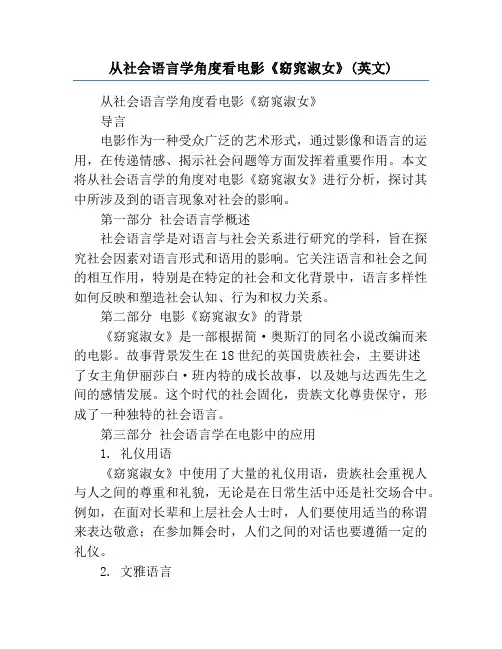
从社会语言学角度看电影《窈窕淑女》(英文)从社会语言学角度看电影《窈窕淑女》导言电影作为一种受众广泛的艺术形式,通过影像和语言的运用,在传递情感、揭示社会问题等方面发挥着重要作用。
本文将从社会语言学的角度对电影《窈窕淑女》进行分析,探讨其中所涉及到的语言现象对社会的影响。
第一部分社会语言学概述社会语言学是对语言与社会关系进行研究的学科,旨在探究社会因素对语言形式和语用的影响。
它关注语言和社会之间的相互作用,特别是在特定的社会和文化背景中,语言多样性如何反映和塑造社会认知、行为和权力关系。
第二部分电影《窈窕淑女》的背景《窈窕淑女》是一部根据简·奥斯汀的同名小说改编而来的电影。
故事背景发生在18世纪的英国贵族社会,主要讲述了女主角伊丽莎白·班内特的成长故事,以及她与达西先生之间的感情发展。
这个时代的社会固化,贵族文化尊贵保守,形成了一种独特的社会语言。
第三部分社会语言学在电影中的应用1. 礼仪用语《窈窕淑女》中使用了大量的礼仪用语,贵族社会重视人与人之间的尊重和礼貌,无论是在日常生活中还是社交场合中。
例如,在面对长辈和上层社会人士时,人们要使用适当的称谓来表达敬意;在参加舞会时,人们之间的对话也要遵循一定的礼仪。
2. 文雅语言以文雅的语言交流是贵族社会的象征之一。
在电影中,伊丽莎白与达西先生之间的对话中运用了很多优美、高雅的词语,彰显了他们的教养和文化修养。
此外,在与人交流时,贵族社会还讲究对语法、词汇和发音的严格要求,以体现社会地位和教育程度。
3. 社会阶层的语言差异电影中描绘了贵族阶层与其他社会阶层之间的语言差异。
贵族社会使用的词汇和语调具有特殊性,反映了他们较高的社会地位。
而其他社会阶层则使用更加朴实、口语化的语言。
这种语言差异不仅仅是文化差异的体现,还反映了社会阶层之间的权力关系和社会地位差异。
4. 男女之间的语言交流电影中男女之间的语言交流方式也是社会语言学的一个重要研究领域。
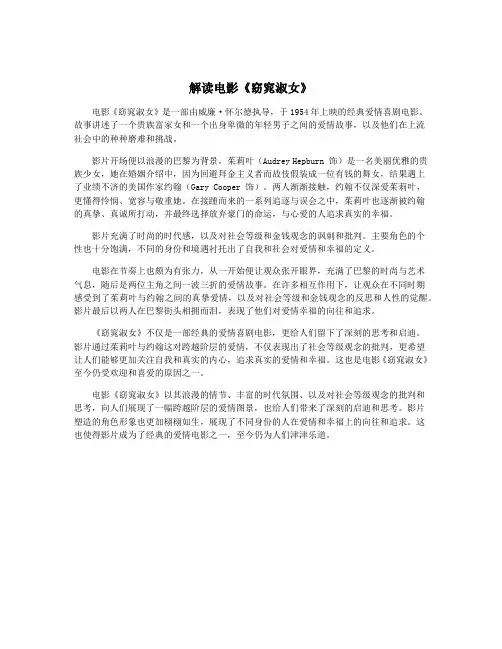
解读电影《窈窕淑女》电影《窈窕淑女》是一部由威廉·怀尔德执导,于1954年上映的经典爱情喜剧电影。
故事讲述了一个贵族富家女和一个出身卑微的年轻男子之间的爱情故事,以及他们在上流社会中的种种磨难和挑战。
影片开场便以浪漫的巴黎为背景,茱莉叶(Audrey Hepburn 饰)是一名美丽优雅的贵族少女,她在婚姻介绍中,因为回避拜金主义者而故伎假装成一位有钱的舞女,结果遇上了业绩不济的美国作家约翰(Gary Cooper 饰)。
两人渐渐接触,约翰不仅深爱茱莉叶,更懂得怜悯、宽容与敬重她。
在接踵而来的一系列追逐与误会之中,茱莉叶也逐渐被约翰的真挚、真诚所打动,并最终选择放弃豪门的命运,与心爱的人追求真实的幸福。
影片充满了时尚的时代感,以及对社会等级和金钱观念的讽刺和批判。
主要角色的个性也十分饱满,不同的身份和境遇衬托出了自我和社会对爱情和幸福的定义。
电影在节奏上也颇为有张力,从一开始便让观众张开眼界,充满了巴黎的时尚与艺术气息,随后是两位主角之间一波三折的爱情故事。
在许多相互作用下,让观众在不同时期感受到了茱莉叶与约翰之间的真挚爱情,以及对社会等级和金钱观念的反思和人性的觉醒。
影片最后以两人在巴黎街头相拥而泪,表现了他们对爱情幸福的向往和追求。
《窈窕淑女》不仅是一部经典的爱情喜剧电影,更给人们留下了深刻的思考和启迪。
影片通过茱莉叶与约翰这对跨越阶层的爱情,不仅表现出了社会等级观念的批判,更希望让人们能够更加关注自我和真实的内心,追求真实的爱情和幸福。
这也是电影《窈窕淑女》至今仍受欢迎和喜爱的原因之一。
电影《窈窕淑女》以其浪漫的情节、丰富的时代氛围、以及对社会等级观念的批判和思考,向人们展现了一幅跨越阶层的爱情图景,也给人们带来了深刻的启迪和思考。
影片塑造的角色形象也更加栩栩如生,展现了不同身份的人在爱情和幸福上的向往和追求。
这也使得影片成为了经典的爱情电影之一,至今仍为人们津津乐道。
从社会语言学的角度分析《窈窕淑女》作者:王茜来源:《青年文学家》2019年第21期摘 ;要:电影《窈窕淑女》讲述了一个贫穷的下层卖花姑娘伊莱莎在著名语言学家希金斯的帮助下,通过改变语言,成为一个优雅的淑女。
本文从地域方言、社会方言,性别差异,语言与权力这四个方面分析《窈窕淑女》,目的是帮助那些虽然已经熟悉语言本身,但仍在使用上存在困惑的学习者提供一个新的角度看待语言。
关键词:《窈窕淑女》;地域方言;社会方言;性别差异;语言与权力作者简介:王茜(1993.12-),女,汉族,万荣县人,现就读于西安外国语大学英文学院2017级外国语言学及应用语言学专业,硕士研究生,主要研究方向:应用语言学。
[中图分类号]:J9 ;[文献标识码]:A[文章编号]:1002-2139(2019)-21--02引言:1964年,电影《窈窕淑女》上映,给人们留下了深刻的印象,它不仅给人们带来视觉享受,还展示了社会因素如何影响语言的使用。
其实,语言是社会习得的,是社会因素限制了人们对语言的使用。
一、社会语言学概论1952年,美国语言学家Hurrie首次提出了“社会语言学”的概念。
然而,直到20世纪60年代末,社会语言学才得到广泛的普及和研究。
Hudson(2000)认为,社会语言学可以被定义为“语言的研究与社会”,也就是说,存在语言和社会之间的关系,社会语言学的目的是要消除语言和社会之间存在什么样的关系,以及语言与社会相互影响。
语言被看作是社会的一面镜子,通过它我们可以更好地了解一个社会的社会活动。
(Hu,2015)参与社会,我们理解社会规范,社会意识形态、社会道德和一些更喜歡这样的社会因素。
正如Lakoff所说的“you are what you say”(引用于Hu, 2015),也就是说一个人说的话能反映其年龄、阶级、性别、民族认同、教育背景、职业和宗教信仰。
《窈窕淑女》是一部反映地域方言、社会方言、性别差异、语言和权力的电影。
解读电影《窈窕淑女》电影《窈窕淑女》是由美国导演杰奇·凯。
电影改编自五十年代英国作家让·W·吉比的同名小说,于2004年上映。
影片讲述了发生在20世纪50年代伦敦的一段爱情故事,情节曲折动人,是一部充满对爱情和社会观念的思考的文艺片。
电影中的女主角是伦敦的一个普通女子伊芙琳,她是一名出色的美术学生,擅长绘画。
伊芙琳始终秉持着崇高的梦想,希望能够通过自己的努力,成为一名著名的画家。
她生活的现实却并不尽如人意。
伊芙琳的家庭并不富裕,她的母亲对她的梦想并不认可,而希望她能够安顿下来,嫁个有钱人。
身边的朋友也对伊芙琳的追求梦想持有怀疑态度。
在这样的压力之下,伊芙琳依然坚持自己的选择。
而男主角可以说是伊芙琳的逆境中最重要的助推者,他是帅气的艺术家·丹尼尔。
两人一见钟情,伊芙琳深受丹尼尔对艺术的热爱与执着所吸引。
丹尼尔带领伊芙琳接触到了艺术创作的各个领域,让她开始审视自己的激情与天赋。
他引导她在艺术道路上获得更多机会和成就,让她逐渐摆脱了社会的束缚。
他们之间的感情日益深厚,丹尼尔成为伊芙琳追求梦想时的坚实后盾。
影片通过伊芙琳与丹尼尔之间的爱情,揭示了当时社会对女性的束缚。
伊芙琳是一个有着自己梦想的女性,她渴望自由和独立,渴望能够通过自己的努力追求自己的人生目标。
当时的社会观念认为,女性应该以婚姻和家庭为重。
伊芙琳的母亲和周围的人也对她的梦想持有怀疑态度,认为艺术对她来说只是一种娱乐,而结婚和定居下来才是她真正应该做的。
电影中通过伊芙琳的经历,展现了女性在追求梦想的道路上所面临的困难和挑战。
通过电影的情节,观众能够感受到伊芙琳的坚定与执着,以及她为了追求梦想所经历的痛苦和努力。
她不仅要面对外界的嘲笑和怀疑,还要面对自己内心的迷茫和困惑。
她并没有放弃,她坚信自己是一个有梦想的女性,愿意用自己的努力去追求自己的目标。
《窈窕淑女》这部电影不仅仅是一个感人的爱情故事,更是一个探讨女性追求梦想和独立的故事。
解读电影《窈窕淑女》电影《窈窕淑女》是一部由菲利普·勃朗宁执导的爱情喜剧片,于1990年上映。
影片改编自1950年的同名电影,讲述了一位窈窕淑女与一个脾气火爆的富商之间的浪漫故事。
影片以1950年代的英国为背景,故事始于伦敦的一个舞蹈学校。
主人公是一位叫做约拉的年轻女孩,她生活在贫民区,梦想成为一名舞蹈家。
一天,她偷偷溜进了昂贵的鞋店,看到了一双漂亮的红舞鞋,非常心动。
为了买到这双鞋子,她不惜卖掉自己所有的物品。
正当约拉在欣赏她的新舞鞋时,她遇到了一个富有而又性格暴躁的商人,他的名字叫朱利安。
朱利安对约拉的舞姿非常着迷,决定花钱聘请她来完成一个任务,那就是教他如何跳舞。
尽管朱利安是一个粗鲁的人,但约拉接受了这个工作,并开始了一段意想不到的冒险。
随着故事的展开,约拉和朱利安之间的互动成为影片的重点。
两人在学习舞蹈的过程中彼此接近,并开始产生感情。
他们来自不同的世界,面临着许多困难和阻碍。
朱利安的家庭不理解他对约拉的感情,而约拉也发现自己深陷其中的矛盾。
尽管如此,他们仍然坚持着自己的爱情,并通过舞蹈来表达彼此之间的情感。
电影通过轻松幽默的方式展现了爱情的力量。
约拉和朱利安之间的爱情是一次跨越社会阶层和传统观念的旅程。
影片以传统与现代、优雅与粗鲁之间的对比来表达这个冲突。
约拉是一个窈窕淑女,代表了纯洁和优雅,而朱利安则是一个经济成功的商人,代表了现代的功利主义。
电影的美术设计和服装也非常出色。
影片中的场景和服装都呈现了1950年代英国社会的风貌。
特别是约拉的舞蹈服装,呈现出了传统的风格,与朱利安的商人装形成了鲜明的对比,进一步突出了他们之间的差异和冲突。
电影《窈窕淑女》是一部浪漫的爱情喜剧片,通过约拉和朱利安之间的故事,向观众展示了爱情的力量和超越社会束缚的勇气。
影片还通过对1950年代英国社会的再现,展现了一种对美的追求和对传统与现代之间冲突的思考。
这部电影将观众带入了一个充满魅力和情感的世界,让人感受到了爱情的甜蜜和人性的美好。
《窈窕淑女》中语言与社会阶层的关系
《窈窕淑女》是一部1956年的电影,讲述了一个卖花女在语言学家的帮助下成为淑女的故事。
在这部电影中,语言与社会阶层的关系得到了充分的展现。
首先,语言是社会阶层的重要标志之一。
在电影中,卖花女伊莱莎操着一口浓重的方言,这反映了她社会底层的身份。
而语言学家希金斯则使用优雅的口音和措辞,这表明了他的贵族身份和教育背景。
其次,语言也可以改变社会阶层。
在电影中,伊莱莎在学习了希金斯教授的语言技巧后,成功地通过了上流社会的语言测试,并成为了一名淑女。
这表明,语言的使用可以影响一个人的社会地位和形象。
最后,电影还探讨了社会对语言的影响。
在电影中,伊莱莎的方言口音被认为是粗俗和不礼貌的,这反映了社会对某些语言的偏见和歧视。
然而,希金斯教授却认为这些语言富有表现力和创造性,这表明社会对语言的看法和态度也会受到社会阶层和文化背景的影响。
总之,《窈窕淑女》通过展现语言与社会阶层的关系,探讨了社会阶层对个人发展的影响,以及语言在社会变革中的作用。
解读电影《窈窕淑女》《窈窕淑女》是一部由梁朝伟和张曼玉主演的经典爱情电影,由王家卫执导。
1990年上映,该电影以其优美的叙事风格和精湛的演技赢得了观众的喜爱和好评。
影片讲述了在上世纪60年代香港,一个男人与一个女人之间的无法自拔与无法言说的爱情故事。
本文将通过分析影片情节,角色塑造,导演手法等方面来解读这部经典电影。
影片通过精致的叙事手法将观众带入了那个时代的香港。
从影片的布景到人物服饰,都体现了当时的风貌和生活方式。
观众可以感受到那个时代的香港是一个繁华而复杂的城市,男女主人公在这个社会中穿梭,承受着各种压力和困扰。
王家卫导演以其独特的镜头语言和剪辑技巧,展现了一个极富诗意和浪漫主义的香港世界。
影片的音乐也是极具代表性的,它使得电影更加具有情感共鸣,观众仿佛被带入了一个温馨而具有禅意的空间。
而讲述这个特殊时代下的爱情故事,男主角周慕云精致的打扮和绅士的风度给人强烈的印象。
他与一个叫陈锦碧的女子发生了一段神秘的感情。
这段感情的发展历程在影片中被细致地叙述,周慕云对陈锦碧的思念和眷恋成了整个影片的核心。
而这种情感的内敛和含蓄,又让这段爱情充满了神秘和戏剧化。
张曼玉饰演的陈锦碧,是一个充满魅力和内敛的女性,她身上散发出的优雅和从容让观众为之着迷。
她对周慕云的情感也是深沉而无法言说的。
这两个人在这个特殊的时代下,经历着种种磨难,却又无法彼此割舍。
影片通过这段爱情的叙述,展现了一种独特的浪漫氛围和情感的厚重。
而王家卫导演对角色的刻画更是淋漓尽致。
周慕云和陈锦碧之间的感情并不是那种轰轰烈烈的爱情,而是一种细水长流的情感。
这种情感的内敛,符合了那个时代香港人的性格和心境。
这一点在影片的叙述和对话中得到了完美的呈现。
观众在观影中,可以感受到这种情感的纯粹和深刻。
而这种纯粹的情感也是王家卫导演一贯追求的艺术风格。
他总是在一些小细节和对话中,表达着一种深刻的情感和对生活的领悟。
这使得《窈窕淑女》成为了一部深具内涵和思想感悟的电影。
本科毕业论文题目:从社会语言学的角度分析电影 《窈窕淑女》的对白学 院:外 国 语 学 院专 业:英 语学 号:****学生姓名:* *指导教师:* * *日 期:2010年6月4日摘 要社会语言学是研究社会和语言之间关系的学科,它包括两个方面,即语言和社会。
语言可以影响社会,社会也可以影响语言。
社会是一个复杂的体系,语言也是一个复杂的体系。
语言的社会功能,使用语言的不同方式,语言的变迁,语言的变体,语言的层次,以及它与政治,社会,文化,法律,人口,心理以及交际等方面的关系都属于社会语言学研究的内容。
文学作品和影视作品既是社会生活的缩影,也是社会生活的延伸和反映。
本文选取一部获得十三项奥斯卡大奖的经典影片《窈窕淑女》为研究对象,研究社会语言学在社会生活中的应用和表现形式,深层次地探究电影中人物对白背后所蕴含和传达的含义——人物的社会地位和心理,而人物的社会地位和心理在特定的场景下对情节又有着怎样的推动作用。
本文将从英语变体,好英语和坏英语,语码转换和话论交替四个方面,节选影片中的重要片段,分析对白在人物塑造和情节发展中起到的重要作用。
本文旨在将社会语言学具体化、实践化,加深对社会语言学的理解,提高对社会语言学的实际运用能力和对影视作品的鉴赏能力。
关键字:社会语言学; 英语变体; 语码转换; 话轮交替AbstractSociolinguistics is a subject which aims at exploring the relationship between society and language. Two aspects, language and society, constitute it. Language and society are mutually influenced. Both society and language belong to complex system. The objects for exploration include the social function of a language, different methods to use language, the transformation of language, the variation of language, the level of language, and the relationship of language with politics, society, culture, legislation, population and communication.The literature work and show work are not only the epitome but also the reflection and distension of the social life. In this paper, the classic film The Fair Lady, which has ever won 13 Oscar Prizes, is chosen as the object to make a research on the application and practice of sociolinguistics in the real life. In this paper, the application and manifestation of sociolinguistics in the social activities will be studied. Implication---the social status and mental state of characters, contained in the dialogue in the film, will be explored. Furthermore, how social status and mental state of characters in a particular scene exert influence on developing the plot on the whole will be studied in the paper. The four main aspects in the research are variation of English, good English and bad English, code-switching and turn-taking. The important episodes will be selected and analyzed to find its important function in molding characters and advancing plot.In this paper, we aim at putting sociolinguistics into practice, deepening our understanding of sociolinguistics, improving our capability to apply sociolinguistics knowledge and appreciate show work.Key words: sociolinguistics; variation of language; code-switching; turn-takingContents1 Introduction (1)2 A Brief Introduction to the Scenario (1)3 Variation of Language (2)3.1 Pronunciation (2)3.2 Grammar (3)3.3 Vocabulary (4)3.4 Dialogue Analysis (4)4 Good English and Bad English (5)4.1 Concepts of Good English and Bad English (5)4.2 Dialogue Analysis (7)5 Code Switching (8)5.1 The concept of Code switching (8)5.2 Dialogue Analysis (9)6 Turn-Taking (11)6.1 The Concept of Turn-Taking (11)6.2 Turn-Taking in Show Work (13)6.3 Dialogue Analysis (14)6.3.1 Turn Distribution and Turn Length (15)6.3.2 Turn Allocation and Turn Sequencing (16)7 Conclusion (17)Bibliography (19)Acknowledgements (21)Analysis of Dialogues in The Fair Ladyfrom Perspective of Sociolinguistics1 IntroductionThis paper establishes a link between sociolinguistics and the famous film The Fair Lady, which is adapted from the play Pygmalion by Bernard Shaw, a famous British playwright, which tells the story of how a phonetician changes a lovely working-class girl into a lady by changing her working-class talk into the speech of an elegant lady. An often quoted sentence from the play is “Once you open your mouth, you are placed”. It means your speech contains a lot of information about yourself—your place of birth, your education, your working experiences, your personal interest, your mood, your state of mind, among other things. The play shows convincingly that language application and social factors are closely related.Generally speaking, in sociolinguistics we are interested in how social factors influence the use of language. For example, when you meet strangers, the way they talk informs you of their social and geographical background, and the way you talk sends out some signals about what you think of them. It is these aspects of language use that sociolinguistics are out to exam. (刘润清,文旭, 2006: 196)In this paper, the film will be analyzed from aspects of variation of English, good English and bad English, code-switching and turn-taking. The emphasis will be attached to the turn-taking. Turn-taking is a complex concept, involving sociolinguistics and pragmatics. Actually, sociolinguistics and pragmatics, sometimes, overlap a lot. This paper tries to carry on the research mainly from the angle of sociolinguistics, with the help of pragmatics.2 A Brief Introduction to the ScenarioProfessor Henry Higgins loves language. He believes that much of the nuances and grandeur of the spoken word is lost. When his friend Hugh Pickering bets that he cannot fool people in upper class into believing a woman from the streets is one of them, he gladly takes the challenge and chooses his protégé.With a fantastic, heavy Cockney accent, Eliza Doolittle, after much coercion, is selected to become his test subject. As he works with her on her diction, he slowly begins to develop an affection for the girl in spite of their glaring differences in age and backgrounds.Through clever phrases such as ‘the rain in Spain stays mainly on the plain’, Eliza slowly develops into a linguistically talented woman. To complete the transformation, she is given new clothes and a new look in hopes that she can be decorated as a refined lady.It is at a horse race that he chooses to expose her to the element he wants desperately to accept her. Prof. Higgins nearly finds success until her rambunctious nature releases itself in the heat of excitement surrounding the equine tournament.Due to his growing angry with her failures at the party, conflict begins to develop between the two which eventually explodes in tempers causing them to part ways. Meanwhile, Eliza has caught the attention of awkward young aristocrat Freddy who loves her in spite of her flaws.The Fair Lady also looks deeply into the semi-romantic relationship between Eliza and Henry. Though they are trainer and pupil, there is a bond that connects them with one another. And, although they have had a lover-like spat, they ultimately realize their affections for one another. (张燕,2009).3 Variation of LanguageThe key point of the research into sociolinguistics is the variation of language. In English-spoken countries and areas, people from different social stratification speak English with distinct differences, which are embodied in three aspects: pronunciation,vocabulary and grammar.(靳梅琳, 2005)3.1 PronunciationThe sociolinguist Trudgill (1990) has ever drawn an accent triangle, that is :RP refers to “received pronunciation, the accent of the best educated and most prestigious members of English society in Britain.”(Janet Holmes, 1987)In Britain and USA, people can be classified as the upper class, the middle class and the working class, taking account of income, education and work and social status. Almost all the people from the upper class and upper middle class speak RP, such as the BBC announcers, teachers and students in Oxford and Cambridge, whereas people from the lowest working class always have the accent which is full of the nonstandard pronunciation.3.2 GrammarFrom the aspect of grammar, the language spoken varies from one class to another. In general, people from the upper class tend to adopt the standard grammar which people from the lowest working class don’t. For example, in standard English, people can say “ I can’t eat anything. ” or “ I can eat nothing.” However, a lot of people ranked in working class express it in the way that “ I can’t eat nothing.” Obviously, they use double negation or even multiple negation to convey the meaningof negation. As we all know, it’s not in keeping with the grammar of standard English. According to a research, higher the class is, less the error exists. In fact, similar grammar errors are embodied in other aspects, including zero copula and zero possessive, such as “He old.’’ and “we house”. (Hudson, 2000)3.3 VocabularyThe third aspect lies in vocabulary. Due to the more educational experience, U-speakers (upper-class English people ) are disposed to complex and uncommon words while non U-speakers favor simple and oral words. In addition, other vocabulary differences come from the daily words because of the different habits. For example, U-speakers adopt sitting room while non U-speakers lounge. U-speakers use lavatory while non U-speakers toilet. U-speakers adopt sofa while non U-speakers settee.3.4 Dialogue AnalysisLook at dialogue 1 :Pickering:I'm afraid not. It's worse than before.Eliza:If it's worse, it's a sign it's nearly over. Cheer up, Capt'n,buy a flow'r off a poor girl.Pickering:I'm sorry, I haven't any change.Eliza:I can change 'alf a crown.Take this for tuppence.Pickering:I told you, I'm awfully sorry. Wait a minutes. Oh, yes. Here's three pence, if that's any use to you.Eliza: Thank you, sir.stranger:You be careful. Better give 'im a flower for it. There's a bloke there behind that pillar...takin' down every blessed wordyou're sayin'.Eliza:I ain't done nothin' wrong by speakin' to the gentleman. I've a right to sell flow'rs if I keep off the curb. I'm a respectable girl, so help me. I neverspoke to ‘im except to ask him to buy a flow'r off me.This is a dialogue at the beginning of the film. We all know that, the beginning of a film is supposed to demonstrate the figure and status of these characters. How tomake this demonstration natural and smooth? One of good methods is the language. The movie The Fair Lady is a typical example of this method.From this dialogue, we can easily classified Eliza into the lower class from the hint of her pronunciation and grammar. She often curtails the vowel in words, such as flower-- flow'r, captain-- Capt'n. She often clips the consonant /h/ in words, such as half-- 'alf, him—’im. She often pronounces /in/ instead of / i/, such as taking-- takin', speaking-- speakin'. All these pronunciation errors are typical characteristics of the pronunciation of people in lower class. In addition, her irregular grammar also reveals her status. For example, “it's a sign it's nearly over”. In this sentence, she omits ‘that’ in the nominal-clause.Eliza’s pronunciation and grammar reveals her social status---working class, undoubtedly, without the help of her dirty and ugly clothes. It lies a foundation for development of following plot. Because of her lower social status, she wants to change her destiny and then find Professor Higgins to correct her poor English. Against that background, the story starts.4 Good English and Bad English4.1 Concepts of Good English and Bad EnglishGood English refers to the standard English, in which words are appropriately used and fit for rule and regulation. In general, good English is supposed to bear widely—accepted and systematic grammar and used by these highly—educated and authoritative people, which could be replete with regional accent. “ It is, however, not necessary to speak RP to speak standard English. Standard English can be spoken with any regional accent.”Compared with the dialects, standard English has higher status and better prestige, which is regarded correct and pure. Nonstandard English is regarded erroneous and corrupt. In terms of linguistics, all language, including their servile dialects, have the same status. The phenomenon that a language is regarded noble, gorgeous and pure is attributed to the social attitude. The so-called good English and bad English are not caused by linguistic factors but social factors. (Robert, 2000)Bad English ( nonstandard English ) is often spoken by under-privileged and humble people. So the pronunciation of rural people in Britain is regarded unpleasant. Things are the same in China. In fact, the attitude we hold to dialect reflects our attitude towards people who speak this dialect.Linguist Robert Pooley made a hierarchic structure for English according to its quality, that is:Illiterate level is listed at the lowest, whose users are mainly the uneducated people. English at illiterate level has disordered tense, missing verb, inappropriate usage of word and erroneous negation, etc.Homely level is higher than illiterate level. English at this level, which is always used by children and lower class in the society, is not widely—accepted. Some talented people, having been limited by the background, job or region, have no access to getting better education and enter into the higher class in the society. They talk in this level of English at home.The third level is informal standard English, which is used by highly—educated people on the informal occasions, such as the teaching class at school, the conversation between two friends. English at this level is not characteristic of pedantry. We can encounter this level of English in the daily life, for example “Who did you send for?’’ or “Where can you get this kind of gloves?”The fourth level is formal standard English. Avoiding the informal style, formal standard English pays attention to the usage of words and sentences. It has canonical grammar, complex sentence structure, more adjunct with appropriate location and strict verb tense, etc. Formal standard English is usually in written style, including document, expository writing argumentative writing, etc. Some conjunctions, adverbs, prepositions and phrases are the symbols of formal style, that is despite, furthermore, inasmuch as, notwithstanding, on the contrary, etc.The top one is the literary level. English at this level, based on the formal standard English, puts more emphasis on the choice of words and the harmony of voice. The author usually infuses passion into his or her expressions. There are evident eloquence, such as metaphor, antithesis and irony, which emit the glamour of art and compel readers’ feeling of beauty.Among these five levels raised by Robert Pooley, the first two are regarded as bad English while the other three belong to good English.4.2 Dialogue AnalysisAccording to the features of every level of English, we can easily tell the background upon which one dialogue happens.Look at dialogue 2:stranger: You be careful. Better give 'im a flower for it. There's a bloke there behind that pillar...takin' down every blessed word you're sayin'.Eliza : I ain't done nothin' wrong by speakin' to the gentleman. I've a right to sell flow'rs if I keep off the curb. I'm a respectable girl, so help me. I never spoketo him except to ask him to buy a flow'r off me.Stranger : What's the bloomin' noise?Stranger : A tec's takin' her down.Eliza : I'm makin' an honest livin'There is no need for us to stare at the screen. Just listening to this dialogue which is full of evident pronunciation and grammar errors, we can tell all characters in this scene come from the lower class.Look at dialogue 3:Mother of Higgins : Colonel Pickering, you’re just in time for tea.Pickering : Thank you, Mrs. Higgins. May I introduce Miss Eliza Doolittle?Mother of Higgins : My dear Miss Doolittle.Eliza : How kind of you to let me come.Mother of Higgins : Delighted, my dear. Lady Boxington.Eliza: How do you do?In dialogue 3, the grammar is standard; the pronunciation is perfect. All people hold RP, the symbol of well-educated people. Undoubtedly, the occurrence of this dialogue is on an occasion in the upper class. People involved in this dialogue are all well-educated and high-positioned.We can make a comparison between Dialogue 2 and Dialogue 3. Obviously, Dialogue 2 occurs in a scene of lower class society due to the informal language in it, while dialogue 3 occurs in a scene of upper class society because of the formal language in it. When we judge a dialogue is formal or not, we can easily predict whether the scene where it happens belongs to upper class or lower class.5 Code Switching5.1 The concept of Code switchingThe concept of language variation in sociolinguistics refers to different manifestations of a language, that is a certain language manifestation for universal use by persons who have the similar social characteristic in the same social circumstances. Some sociolinguists use the concept of code, instead of the concept of language variation.(李宗利,2005.)The language variation is often seen as the standard of appraiser to the holder of the variation. Language variations consist of standard variation and non-standard variation.(Martin, 1995.)In terms of history, the standard variation of English is on the basis of the London dialect, which has developed after the invasion of Britain from Norman people and their transfer from Manchester to London. The non-standard variation includes the regional variation and the social variation. The holders of standard variation are usually more pregnant andhigher-positioned. Code-switching means the interacting use of two or more variations in a language by one person. (黎娜,2005)5.2 Dialogue AnalysisLook at dialogue 4 from the movie:Higgins:Would you rather marry Pickering?Eliza:I wouldn't marry you if you asked me and you're nearer my age than what he is.Higgins:-Than he is.Eliza :I'll talk as I like, you're not my teacher. That's not what I want and don't you think it is. I've always had chaps enough wanting me that way. Freddy Hillwrites me twice and three times a day. Sheets and sheets.Higgins:In short, you want me to be as infatuated about you as he is, is that it? Eliza:No, I don't. That's not the sort of feeling I want from you.I want a little kindness. I know I'm a common, ignorant girl, and you're a book-learnedgentleman......but I'm not dirt under your feel. What I done...what I did wasnot for the taxis and the dresses......but because we were pleasant together,and I come to...came......to care for you. Not to want you to make loveto ...and not forgetting the difference between us, but......more friendly like.……Eliza:I'll go and be a teacher.Higgins:What'll you teach, in heaven's name?Eliza: What you taught me. I'll teach phonetics. I'll offer myself as an assistant to that brilliant Hungarian.Higgins:What, that imposter? That humbug? That toadying ignoramus? Teach him my methods, my discoveries? You take one step in that direction, I'll wringyour neck!Eliza:Wring away! What do I care? I knew you'd strike me one day.That's done you, 'Enry 'lggins, it 'as. Now, I don't care for your bullyin' an'your big talk.This dialogue occurs in the house of Higgins’ mother. After the deceitful success in the dancing party, Eliza can not bear arrogance and negligence from Higgins, and escape from the house of Higgins. When she is complaining to Higgins’ mother, she encounters Higgins, who is trying to seek her everywhere. In the preceding dialogue, there are three areas of code-switching.(1) The first one is that “I wouldn't marry you if you asked me and you're nearer my age than what he is.”The grammar and the phrase-using in the first half of the sentence are the norm, belonging to the standard code of English. This code-switching is under no intention of Eliza and in agreement of her humble background. However, the more important function lies in making cushion for the conflict in the next sentence. Higgins rectifies her error but encounter her peremptory refuse in the next sentence. Through this code-switching, what is reflected is that Eliza is no longer addicted to the upper-class society and no longer dependent on Higgins.(2) The second one is that “What I done...what I did was not for the taxis and the dresses......but because we were pleasant together, and I come to...came......to care for you." This code-switching is under the intention of Eliza. She takes “what I did…” instead of “what I done…”. She also changes “I come to …” into “I came to…” She is intends to convert her non-standard code to the standard code, which in fact is the conversion of her attitude of mind. When Higgins mitigates his attitude to Eliza, Eliza also becomes tender and opens her heart. For the sake of matching the confabulation with Higgins, she rectifies her habitual non-standard code, to draw near the distance with Higgins, revealing that she still bears profound love to Higgins.(3)“Wring away! What do I care? I knew you'd strike me one day.That's done you, 'Enry 'lggins, it 'as. Now, I don't care for your bullyin' an' your big talk。